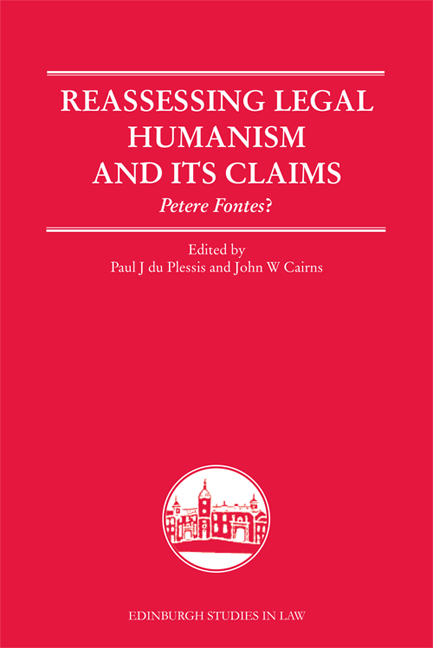Book contents
- Frontmatter
- Contents
- Preface
- A Note on Names and Book Titles
- List of Contributors
- List of Abbreviations
- Introduction
- Part I DEFINING LEGAL HUMANISM
- Part II A BREAK WITH THE PAST/CONTEMPORARY CRITIQUES
- Part III LEGAL HUMANISM: A PAN-EUROPEAN METHODOLOGY?
- Part IV LEGAL HUMANISM AND THE BOOK TRADE
- Postscript
- Index
Postscript
Published online by Cambridge University Press: 05 September 2016
- Frontmatter
- Contents
- Preface
- A Note on Names and Book Titles
- List of Contributors
- List of Abbreviations
- Introduction
- Part I DEFINING LEGAL HUMANISM
- Part II A BREAK WITH THE PAST/CONTEMPORARY CRITIQUES
- Part III LEGAL HUMANISM: A PAN-EUROPEAN METHODOLOGY?
- Part IV LEGAL HUMANISM AND THE BOOK TRADE
- Postscript
- Index
Summary
The chapters contained in this volume have been arranged in a specific order with a view to reassessing larger claims about legal humanism. As such, it is not merely an edited collection loosely arranged around a central theme. Rather, it is an attempt to initiate further discussion about legal humanism and its role in the narrative of European legal history in a structured and systematic way.
The four parts of this volume deal with certain fundamental questions. In the first part, “Defining legal humanism”, Olser and Wijffels outline some of the main problems in identifying and defining legal humanism as a movement in the narrative of European legal history. Their contributions show that there is little scholarly consensus on the essential features of legal humanist scholarship and consequently also on the convenient classification of a jurist as a “legal humanist” or “other”, characteristic of earlier works on European legal history.
This uncertainty about method and classification foregrounds the next part, “A break with the past/ contemporary critiques”. It is a well-established and often-repeated topos in earlier scholarship on European legal history that legal humanism represented a break with the legal method of the Bartolists. While the latter were seemingly applying Roman law to the contemporary problems of the day, the former were preoccupied with seemingly ephemeral issues of textual criticism and philological analysis, thereby contributing to the “historicising” of Roman law. This fundamental question is addressed here. In this section, the contributions of Prévost, Rossi and Longfield Karr collectively demonstrate two important points. First, that the break with the past was in fact not a break at all. Rather, humanist scholars continued to engage with medieval legal scholarship in a profound, albeit selective manner. In doing so, they were not above criticising the medieval lawyers for their failings. More importantly, however, as Rossi and Longfield Karr show, the legal humanists’ preoccupation with seemingly trivial matters of textual analysis was directly aimed at contemporary concerns. Using history and philosophy, they launched a devastating critique against problems connected with the emerging idea of the nation state such as sources of power, government corruption and the absence of good governance.
- Type
- Chapter
- Information
- Reassessing Legal Humanism and its ClaimsPetere Fontes?, pp. 377 - 380Publisher: Edinburgh University PressPrint publication year: 2015



